

The Raven by Edgar Allan Poe – |MP3| (read by Anne Cheng)
ONCE upon a midnight dreary, while I pondered, weak and weary,
Over many a quaint and curious volume of forgotten lore—
While I nodded, nearly napping, suddenly there came a tapping,
As of some one gently rapping, rapping at my chamber door.
“ ’Tis some visitor,” I muttered, “tapping at my chamber door—
Only this and nothing more.”Ah, distinctly I remember it was in the bleak December,
And each separate dying ember wrought its ghost upon the floor.
Eagerly I wished the morrow;—vainly I had sought to borrow
From my books surcease of sorrow—sorrow for the lost Lenore—
For the rare and radiant maiden whom the angels name Lenore—
Nameless here for evermore.And the silken sad uncertain rustling of each purple curtain
Thrilled me—filled me with fantastic terrors never felt before;
So that now, to still the beating of my heart, I stood repeating
“ ’Tis some visitor entreating entrance at my chamber door—
Some late visitor entreating entrance at my chamber door;
This it is and nothing more.”Presently my soul grew stronger; hesitating then no longer,
“Sir,” said I, “or Madam, truly your forgiveness I implore;
But the fact is I was napping, and so gently you came rapping,
And so faintly you came tapping, tapping at my chamber door,
That I scarce was sure I heard you”—here I opened wide the door;—
Darkness there and nothing more.Deep into that darkness peering, long I stood there wondering, fearing,
Doubting, dreaming dreams no mortals ever dared to dream before;
But the silence was unbroken, and the stillness gave no token,
And the only word there spoken was the whispered word, “Lenore!”
This I whispered, and an echo murmured back the word, “Lenore!”—
Merely this and nothing more.Back into the chamber turning, all my soul within me burning,
Soon again I heard a tapping something louder than before.
“Surely,” said I, “surely that is something at my window lattice;
Let me see, then, what thereat is, and this mystery explore—
Let my heart be still a moment, and this mystery explore;—
’Tis the wind and nothing more.”Open here I flung the shutter, when, with many a flirt and flutter,
In there stepped a stately Raven of the saintly days of yore.
Not the least obeisance made he; not a minute stopped or stayed he,
But, with mien of lord or lady, perched above my chamber door—
Perched upon a bust of Pallas just above my chamber door—
Perched, and sat, and nothing more.Then this ebony bird beguiling my sad fancy into smiling,
By the grave and stern decorum of the countenance it wore,
“Though thy crest be shorn and shaven, thou,” I said, “art sure no craven,
Ghastly grim and ancient Raven wandering from the Nightly shore—
Tell me what thy lordly name is on the Night’s Plutonian shore!”
Quoth the Raven, “Nevermore.”Much I marvelled this ungainly fowl to hear discourse so plainly,
Though its answer little meaning—little relevancy bore;
For we cannot help agreeing that no living human being
Ever yet was blessed with seeing bird above his chamber door—
Bird or beast upon the sculptured bust above his chamber door,
With such name as “Nevermore.”But the Raven, sitting lonely on that placid bust, spoke only
That one word, as if his soul in that one word he did outpour.
Nothing further then he uttered; not a feather then he fluttered—
Till I scarcely more than muttered: “Other friends have flown before—
On the morrow he will leave me, as my Hopes have flown before.”
Then the bird said, “Nevermore.”Startled at the stillness broken by reply so aptly spoken,
“Doubtless,” said I, “what it utters is its only stock and store,
Caught from some unhappy master whom unmerciful Disaster
Followed fast and followed faster till his songs one burden bore—
Till the dirges of his Hope that melancholy burden bore
Of ‘Never—nevermore.’ ”But the Raven still beguiling all my sad soul into smiling,
Straight I wheeled a cushioned seat in front of bird and bust and door;
Then, upon the velvet sinking, I betook myself to linking
Fancy unto fancy, thinking what this ominous bird of yore—
What this grim, ungainly, ghastly, gaunt, and ominous bird of yore
Meant in croaking “Nevermore.”This I sat engaged in guessing, but no syllable expressing
To the fowl whose fiery eyes now burned into my bosom’s core;
This and more I sat divining, with my head at ease reclining
On the cushion’s velvet lining that the lamp-light gloated o’er,
But whose velvet violet lining with the lamp-light gloating o’er
She shall press, ah, nevermore!Then, methought, the air grew denser, perfumed from an unseen censer
Swung by Seraphim whose foot-falls tinkled on the tufted floor.
“Wretch,” I cried, “thy God hath lent thee—by these angels he hath sent thee
Respite—respite and nepenthe from thy memories of Lenore!
Quaff, oh quaff this kind nepenthe and forget this lost Lenore!”
Quoth the Raven, “Nevermore.”“Prophet!” said I, “thing of evil!—prophet still, if bird or devil!—
Whether Tempter sent, or whether tempest tossed thee here ashore,
Desolate, yet all undaunted, on this desert land enchanted—
On this home by Horror haunted—tell me truly, I implore—
Is there—is there balm in Gilead?—tell me—tell me, I implore!”
Quoth the Raven, “Nevermore.”“Prophet!” said I, “thing of evil!—prophet still, if bird or devil!
By that Heaven that bends above us—by that God we both adore—
Tell this soul with sorrow laden if, within the distant Aidenn,
It shall clasp a sainted maiden whom the angels name Lenore—
Clasp a rare and radiant maiden whom the angels name Lenore.”
Quoth the Raven, “Nevermore.”“Be that word our sign of parting, bird or fiend!” I shrieked, upstarting—
“Get thee back into the tempest and the Night’s Plutonian shore!
Leave no black plume as a token of that lie thy soul hath spoken!
Leave my loneliness unbroken!—quit the bust above my door!
Take thy beak from out my heart, and take thy form from off my door!”
Quoth the Raven, “Nevermore.”And the Raven, never flitting, still is sitting, still is sitting
On the pallid bust of Pallas just above my chamber door;
And his eyes have all the seeming of a demon’s that is dreaming,
And the lamp-light o’er him streaming throws his shadow on the floor;
And my soul from out that shadow that lies floating on the floor
Shall be lifted—nevermore
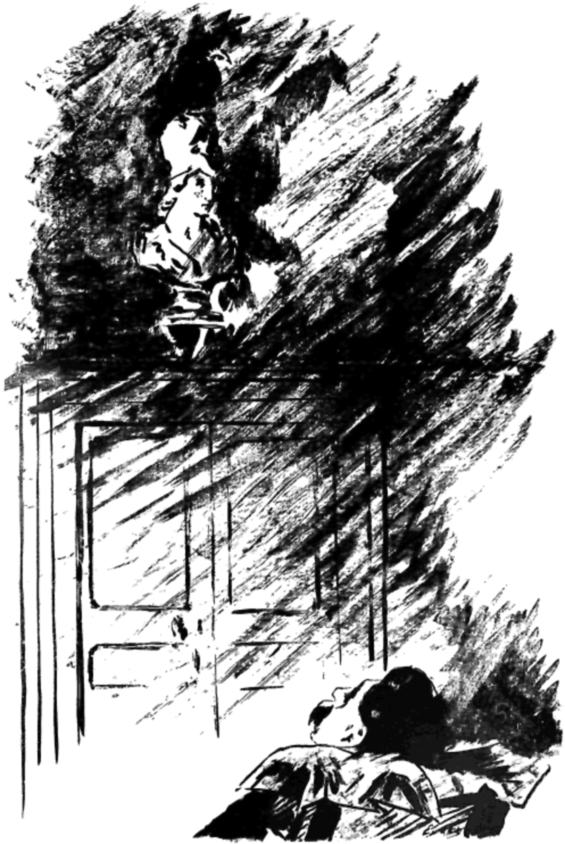
Edmund C. Steadman, in the introduction to Gustave Doré’s 1884 illustrated edition of The Raven, argues that while The Raven may not be Edgar Allan Poe’s best work that it is certainty “his representative poem” in part because it deals with his major theme: “the irretrievable loss of an idolized and beautiful woman.” And to my ears it certainly is a “treasure of mankind.” But, because of its length and accessibility, I think it is capable of being appreciated by even the roughest of barbarian hearts.
And why is that?
I’d suggest that the supernatural element, or the ambiguity of such, helps a lot. Ghosts, gods and demons are easy entry points.
Think of it as a more palatable forerunner to paranormal romance. Perhaps this kind of literature is best called “Dark Romanticism.”
From Wikipedia:
Dark Romanticism (often conflated with Gothicism or called American Romanticism) is a literary subgenre. It has been suggested that Dark Romantics present individuals as prone to sin and self-destruction, not as inherently possessing divinity and wisdom. G.R. Thompson describes this disagreement, stating “the Dark Romantics adapted images of anthropomorphized evil in the form of Satan, devils, ghosts, werewolves, vampires, and ghouls.” For these Dark Romantics, the natural world is dark, decaying, and mysterious; when it does reveal truth to man, its revelations are evil and hellish.
Now dark romanticism may just sound like a more literary description of paranormal romance, minus the mention of a myriad of tattoos, but its authors tackled tough subjects like the pointlessness of a loveless existence in a world without an afterlife. In a way that’s an inversion of paranormal romance.
So on that happy note, and bearing in mind the generally accepted saw that “Life is stranger than fiction”, my question for your barbarian heart is slightly different:
Is real life more horrific than fiction?
Poe’s answer in The Raven, I think, is that it is and by a wide margin.
I’m fairly confident that a wholly naturalistic interpretation of why The Raven quoth “nevermore” can be found in the lines (62-65):
“Doubtless,” said I, “what it utters is its only stock and store,
Caught from some unhappy master, whom unmerciful Disaster
Followed fast and followed faster till his songs one burden bore—
Till the dirges of his Hope the melancholy burden bore
And if it is true that the titular raven is not supernaturally prophetic, and its speech no more than mere mimicry, is the message it brings to the unnamed narrator at all lessened by a naturalistic interpretation?
I thought not.
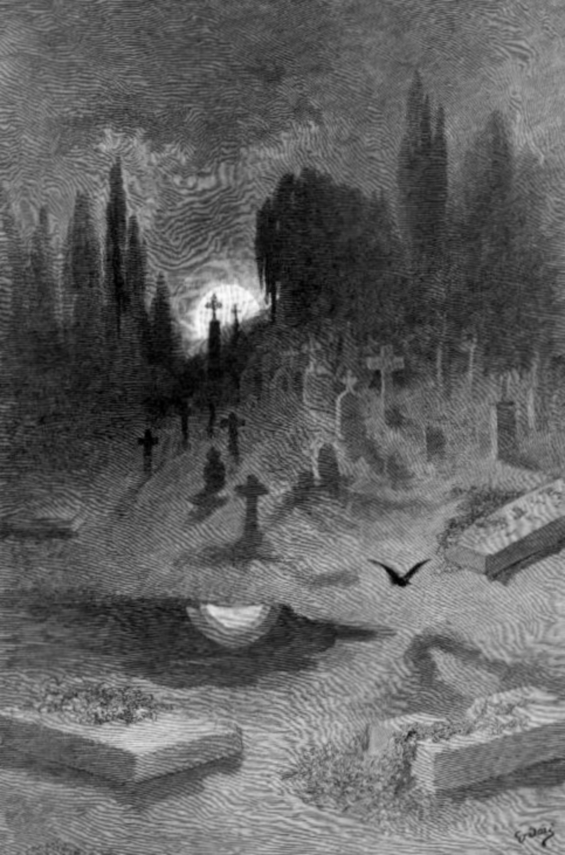
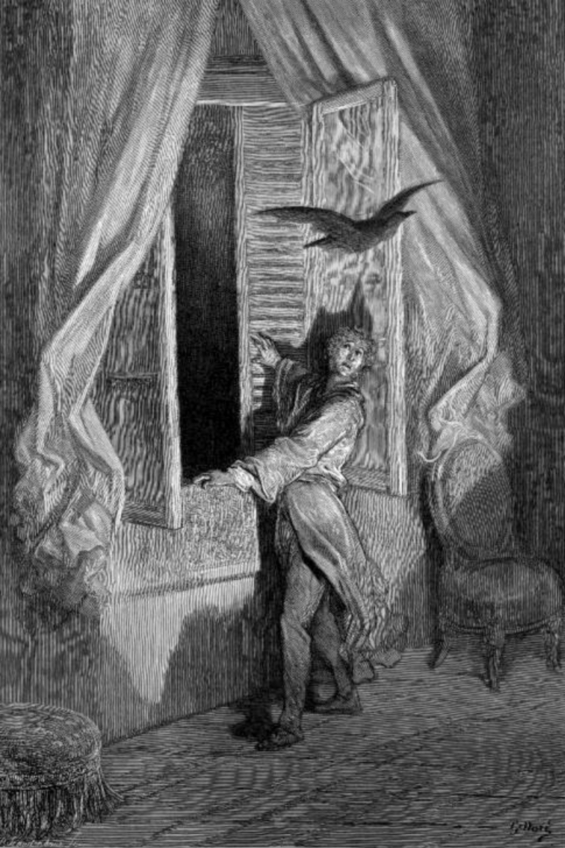
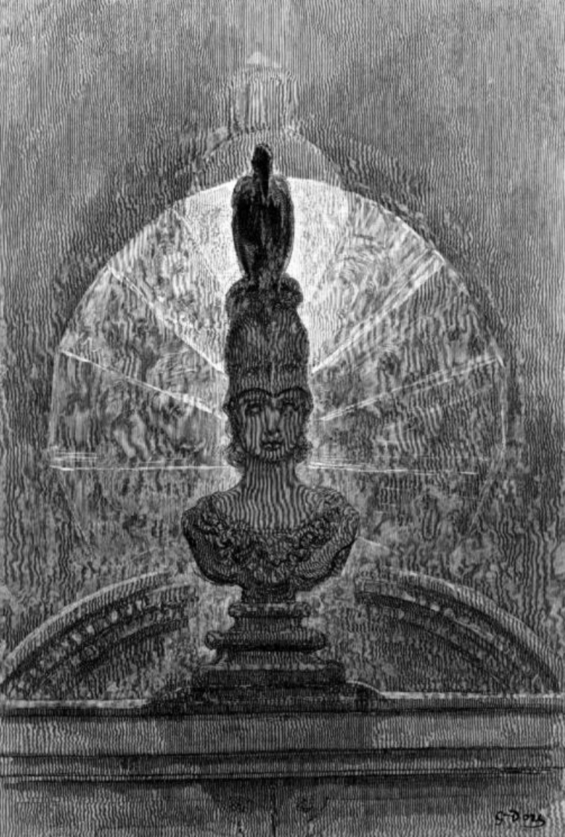
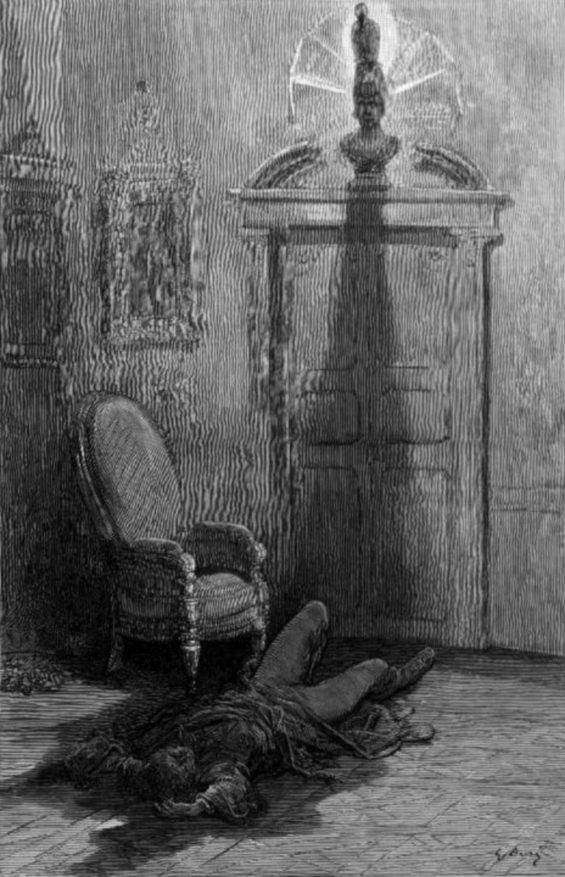
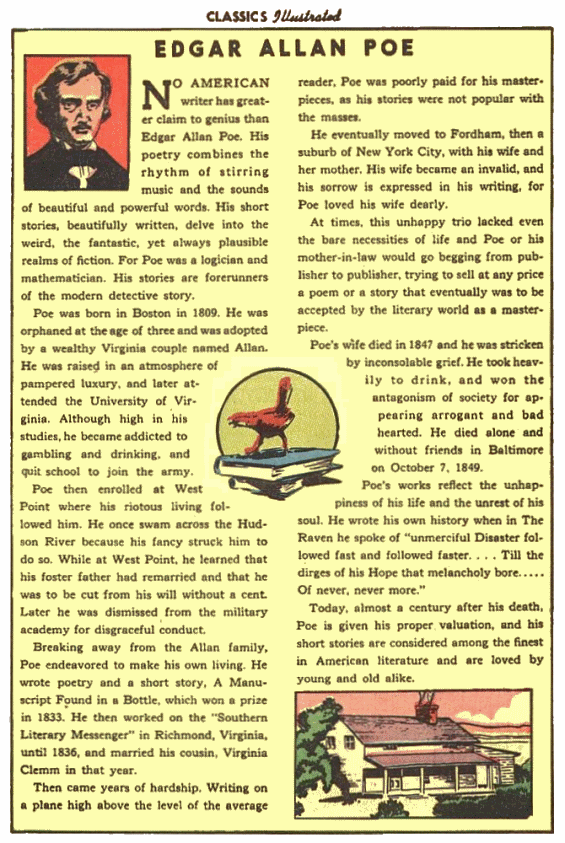
[via LibriVox and Gutenberg.org]
Posted by Jesse Willis
This might be only my subjective opinion, but nonetheless, Poe was a master of his genre and a genius like no other. “The Raven” has it all: perfection of rhythm, a universal theme which touches upon the emotions of every human being, words carefully chosen to fit the mood of the poem as if he brooded over each and every one of them for hours to find that one that was, if I may use the words of Goldilocks “juuuuuuust right” :) Only a tortured soul could create pure poetic perfection…
Poe’s victim here slowly begins to realize that the raven is there to cut him to the heart. When the first tapping comes he says: “Tis the wind and nothing more.” Gradually he realizes the birds intent. “Take thy beak from out my heart!” A masterpiece. You’ll never ever see her again. That is the Raven’s message! The greatest poem of all time!!!